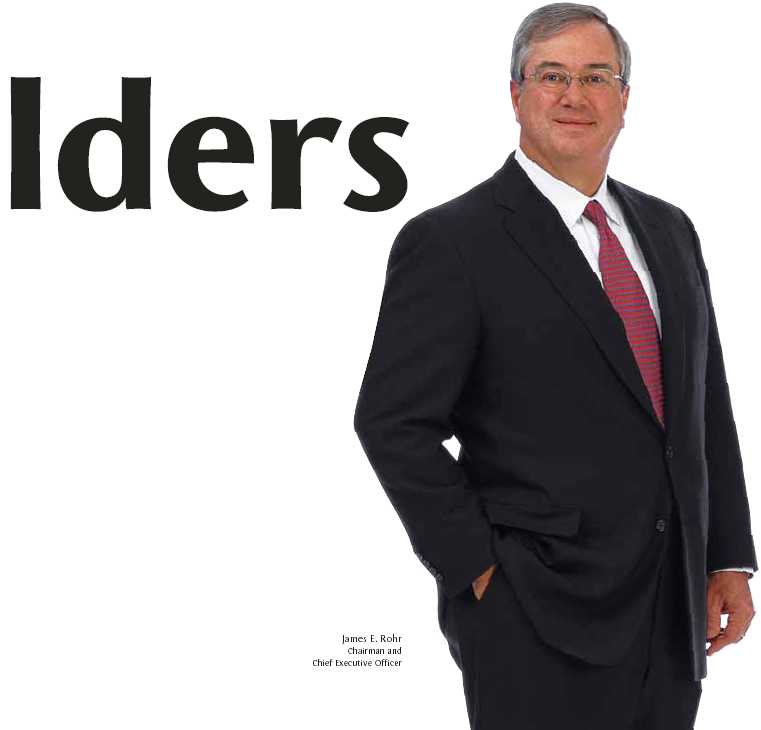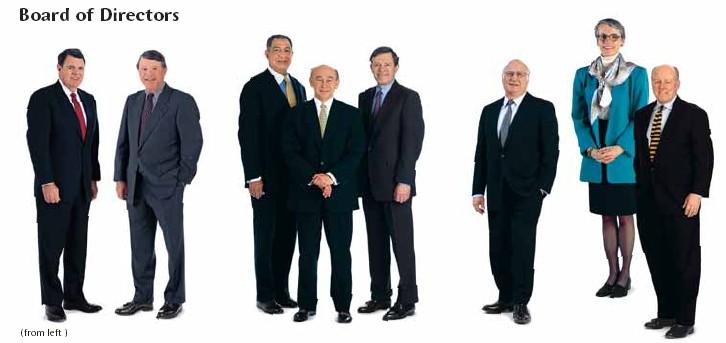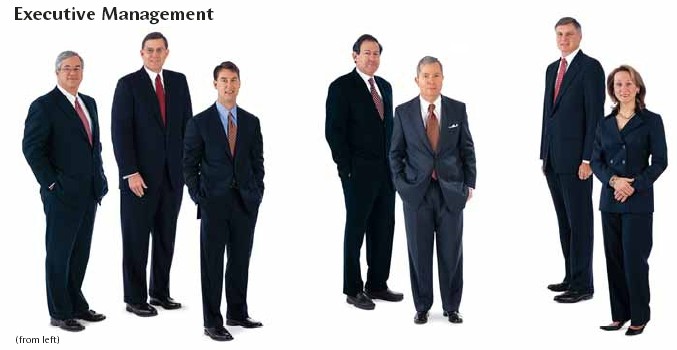PNC FINANCIAL SERVICES GROUP 2003 SUMMARY ANNUAL REPORT
Published on March 19, 2004
Exhibit 99.1
Every day is an opportunity

to do more
The words that grace the cover and inside panel of this report reflect our unwavering focus on the people we serve. Every day we can do more for our customers, employees, communities and, of course, you, our shareholders.
dear fellow PNC shareholders
Last year, guided by a deep commitment to our values and a relentless focus on our customers, our dedicated team of 23,000 employees made significant progress on our number one priority: growing PNC.
Our efforts delivered solid financial results, created value for our shareholders, and positioned PNC to generate sustainable growth.
| | We earned $1 billion and grew our customer base in almost every business. |
| | We took steps to become an even more attractive investment to shareholders, increasing our quarterly dividend by four percent in the fall, and repurchasing 10.8 million shares of common stock. These initiatives contributed to a 30 percent increase in our stock price in 2003. |
| | We made significant investments in our businesses, including the acquisition of United National Bancorp, which was completed at the beginning of 2004. |
These accomplishments were augmented by our actions to fundamentally strengthen our platform for growth.
| | Our industry-leading technology capabilities fueled revenues and created efficiencies. In 2003, our team earned the highest ranking in financial services and was 19th overall in Information Weeks annual list of 500 top technology innovators. |
| | Our strong capital position enabled us to make substantial investments while positioning PNC for improved shareholder returns. We will maintain a disciplined approach to investing your capital moving forward one designed to provide us with the flexibility to compete and create |
2

value in what has become a more dynamic financial services industry.
| | We continued to enhance our performance-driven culture. Through our Chairmans Challenge referral program, non-sales employees generated the same amount of deposits in 10 months as four typical branches would in one year. |
| | We made further enhancements to our risk management systems and corporate governance. As a result, we dramatically improved asset quality, and Standard & Poors, Moodys and Fitch upgraded our debt rating outlook. Separately, our banking regulators lifted their written agreements related to the restatement of our 2001 earnings. We also reached an agreement with the Department of Justice regarding these events. With these challenges behind us, we are pleased that we have been able to return our complete attention to growing PNC. |
We will maintain a disciplined approach to investing your capital moving forward one designed to provide us with the flexibility to compete and create value in what has become a more dynamic financial services industry.
| | We strived to become even more integral to the communities we serve. We introduced PNC Grow Up Great, a 10-year, $100 million program to improve school readiness, one of our nations most critical issues. PNC Grow Up Great is one of the most comprehensive corporate school readiness programs in the country. |
Winning in a Highly Competitive Industry
With recent mergers forming financial services firms that near or top $1 trillion in assets, some have asked what it will take to compete in our industry. We do not believe that size alone dictates success. To us, the more important issue is how well a company can differentiate itself to profitably grow its customer base.
Clearly, we believe PNC has built the scale and expertise to compete and win on this front in each of our businesses and each of our markets.
Our confidence is rooted in our proven ability to execute over time and in the strategic plan we developed. Simply put, we plan to expand our high-performing banking franchise and grow our global asset management and processing businesses.
We launched several initiatives to bring this plan to life in 2003. In particular, we took important steps to leverage our successful regional banking model in high-growth markets.
We completed the acquisition of United National Bancorp on the first day of 2004. This franchise adds more than 50 branches and more than 100,000 new customers in attractive regions of central New Jersey and the Lehigh Valley of Pennsylvania.
We believe this acquisition provides growth opportunities for all of our banking businesses. In addition, to further our growth in New Jersey, we also plan to open offices in 40 Stop & Shop supermarket locations. When combined with the new United National branches, our branch presence in that demographically attractive state should expand by one-third over the next five years.
Growing PNC
Beyond the acquisition of United National, we made notable progress in all of our businesses in 2003.
| | Regional Community Banking increased checking customer relationships by four percent, and grew home equity loans by 17 percent. |
| | BlackRock grew net income by 17 percent and increased assets under management by 13 percent to $309 billion. |
4
| | Wholesale Banking grew net income by nine percent and continued to win targeted clients, with virtually all segments exceeding their sales plans. |
| | PNC Advisors made significant strides in improving client retention while working to address the challenges created by a dynamic wealth management environment. |
| | PFPC attracted and retained a significantly higher number of clients than in 2002 and increased accounting and administration assets serviced by 31 percent. |
We are committed to creating a customer experience that differentiates PNC.
To build on this progress, we have outlined a number of important business initiatives that are discussed throughout this report. However, I would like to focus on three broad growth drivers that impact all of our businesses.
First, we are committed to creating a customer experience that differentiates PNC.
In Regional Community Banking, for example, our industry-leading technology has enabled us to build one of the top call centers in the country as well as a robust and easy-to-use Web site. In fact, 43 percent of our checking customers bank with us online, one of the highest penetration rates in the industry.
At PNC Advisors, we have improved the client experience by enhancing our financial planning capabilities in every market we serve. We also added new products, such as managed accounts, which provide clients with more tailored investment options.
In Wholesale Banking, we are committed to anticipating client needs and creating customized technology-based solutions. This strategy earned our treasury management group an impressive list of new clients, including Dell, IBM and the Veterans Administration. And PNC received the highest grade for cash management quality in the 2004 Phoenix Hecht Cash Management Monitor survey for large U.S. corporations.
Second, we are working more closely together than ever before. We have established more detailed cross-business sales goals and developed teams to help achieve them.
We still have room for improvement, but many signs are encouraging. Last year, our corporate finance group successfully referred almost 50% more business to PNC Advisors than planned.
Third, we have made retaining and attracting highly skilled and experienced employees a top priority.
In working to build a performance-driven culture, we provide training and incentives that empower each employee to grow PNC. In addition, we regularly measure employee satisfaction, which improved in several areas last year.
We also continue to attract some of the best talent in the industry, including the following recent additions to our team:
| | Bill Parsley, who formerly headed the global derivative businesses at J.P. Morgan Chase, joined us as treasurer and chief investment officer. He will help us to further enhance the way we manage our balance sheet and investments. |
| | Former Under Secretary of the U.S. Treasury Peter Fisher joined BlackRock to help build its global investment and risk management business. |
| | Hugh Frater has come to PNC from BlackRock, where he headed its real estate group. Hugh will lead our real estate activities, helping us build on the national prominence we have established in this industry. |
5
Taken together, these growth drivers will help us address continuing challenges.
Addressing Challenges
With expectations for moderate economic and market growth, as well as weak loan demand industry wide, we accelerated efforts to reduce costs and improve operating leverage.
Beyond the launch of PNC Grow Up Great, we provided more than $11 million through The PNC Foundation to hundreds of community organizations in 2003. And our employees built on the one million volunteer hours they have contributed over the last few years.
Last year, we set out to improve efficiency by $100 million on a run rate basis. We exceeded that goal by nearly 50 percent. The bulk of those savings came through system and process enhancements at PFPC and rationalizing delivery systems in Regional Community Banking and PNC Advisors.
Our growth initiatives and continuing efforts to improve efficiency should help us address interest rate pressures. We will not alter our disciplined approach to interest rate and enterprise-wide risk management, which we believe will help us deliver stronger risk-adjusted returns over the long term.
Culture and Community
Although the challenges we face are not unique, the team we have built to address them and achieve all of our goals is.
We deeply value the contributions of our 23,000 employees. We reward individual and team success, and we provide one of the industrys best benefits plans. Through providing flexible work arrangements, two backup child care centers and other work-life programs, we once again earned the distinction of being named one of the 100 best companies for working mothers by Working Mother magazine. These efforts, among others, have helped us create a culture that fosters quality performance.
Our workforce has also become more diverse. We have significantly increased the number of minorities in senior management. In addition, we have taken steps to further improve diversity at every level. Last year PNC served as a national sponsor of the National Urban League conference, and we served as a sponsor and were actively involved in the National Black MBA conference.
These two events represent a small sampling of our unwavering commitment to the communities we serve.
Beyond the launch of PNC Grow Up Great, we provided more than $11 million through The PNC Foundation to hundreds of community organizations in 2003. And our employees built on the one million volunteer hours they have contributed over the last few years.
We are very proud of these initiatives and all that we have accomplished in 2003.
Of course, it has very much been a team effort. I would like to thank our board of directors and senior executive team for their extraordinary contributions. I also want to express my deep appreciation to our customers and shareholders for their ongoing faith and trust in our company.
We look forward to earning your continued confidence as we work to grow PNC.
| Sincerely, |
| /s/ James E. Rohr |
| James E. Rohr Chairman and Chief Executive Officer |
6
Are you satisfied with your current business mix?
ROHR: We like our business mix. It provides us with a diverse revenue stream, and in many ways the businesses complement each other.
Take PFPC, for example. It provides accounting and administration processing for BlackRock funds. At the same time, our treasury management group sweeps more than $5 billion in deposits monthly to BlackRock money market funds on behalf of our clients.
Our banking businesses also provide us with many cross-sell opportunities. Relationship managers from our corporate and business banking segments regularly refer prospects to PNC Advisors and vice versa.
With that said, we have room for improvement. We have asked our entire team to intensify their cross-business revenue and efficiency efforts.
q+a with Chairman and Chief Executive Officer Jim Rohr, President Joe Guyaux and Vice Chairman and Chief Financial Officer Bill Demchak
How will PNC differentiate and grow its banking businesses in this dynamic financial services environment?
GUYAUX: Both large and small financial services companies have to acquire, grow and retain profitable customer relationships to be successful. Our banking businesses are positioned to do just that.
In addition to our outstanding traditional products and services, Regional Community Banking has developed alternative channels, such as Workplace Banking, University Banking and our Chairmans
7
Challenge employee referral program. These channels make it easier for prospective customers to choose PNC and, combined, have attracted 26% of our new checking customer relationships.
In Wholesale Banking, we are intensely focused on growth. We have had great success in winning customers across our business segments who are more profitable and meet our desired risk profile. Our strategy is to leverage our client base to emphasize our leading treasury management, capital markets, leasing and institutional trust products, which we feel provide us with a great opportunity for growth.
We also operate in some very affluent regions, containing roughly $1.7 trillion in investable assets. No one asset management firm has more than a four percent market share. With our enhanced product line, talented people and emphasis on becoming our clients trusted advisor, we have positioned PNC Advisors to win more than its share of that business moving forward.
You have a strong capital position. How does PNC manage its capital?
DEMCHAK: One of the primary responsibilities we have is to manage capital in a way designed to drive value for our owners.
We apply a disciplined approach. First, we look for value-added opportunities to invest in our businesses, such as the purchase of United National, which strengthened our banking businesses. When these options are not available, we return capital to our shareholders through our dividend or share repurchase program.
For example, in 2003 we raised the dividend by more than four percent and repurchased 10.8 million shares of PNC stock.
How are you driving growth at BlackRock and PFPC?
ROHR: We are excited about the growth opportunities in each of these businesses.
BlackRocks growth continues to be fueled by investment performance and exceptional client service. While continuing to invest in its core fixed income franchise, BlackRock has selectively expanded its equity and alternatives capabilities, added resources in BlackRock Solutions® and enhanced marketing efforts worldwide, all of which contributed to last years results and will help drive future growth.
William S. Demchak
Vice Chairman and
Chief Financial Officer

Joseph C. Guyaux
President
8

James E. Rohr
Chairman and Chief Executive Officer
We have made great progress at PFPC. We have made the business more efficient by enhancing systems and rationalizing processes. At the same time, we have re-energized PFPCs marketing engine and made investments to further enhance its premier technology-based solutions. The result: despite continued pricing pressures, PFPC is much more competitive and we are winning a greater share of business.
What is PNC doing to address the challenging interest rate environment?
DEMCHAK: I think this has the potential to be a major issue in the industry. Our goal is to manage interest rate risk in a way that maximizes the value of equity over time.
In this historically low rate environment, we have not chosen the cash-and-carry trade of buying long-term securities and funding them with short-term liabilities. As a result, we have had some pressure on net interest income. However, we believe that the firm is better positioned than most in a changing rate environment, which is what we anticipate later in 2004.
How would you describe the culture PNC has created?
GUYAUX: The PNC culture is defined by an unwavering commitment to our values and high performance for our customers, shareholders, employees and communities.
It all starts by empowering employees. The more employees feel capable of meeting customer needs, the better PNC is positioned to achieve the growth we seek. To support this objective, we have invested a significant amount of time and effort on sales, product and leadership training. This helps members of our team grow both personally and professionally.
In the culture we have built, teamwork and individual performance are required and expected. Of course, they are also rewarded. We do this through a number of recognition programs, including the PNC Performance Award, which is given annually to a select number of employees who best reflect our values.
Our overall approach leads to high levels of employee and customer satisfaction, which we consistently monitor. Because we truly believe it is not only about the results we achieve, but how we achieve them.
9
our Platform for Growth
At PNC we have made focused investments in our businesses, our employees and our communities. We believe these are the essential planks of our platform to drive growth and create value for all the people we serve. Here are just a few examples of how we do that on each front.
our businesses
Regional Community Banking provides banking and financial services to 1.8 million consumers and more than 200,000 small businesses.
Wholesale Banking provides financial services solutions to middle market and large corporations in our region and specialized real estate finance and asset-based lending nationally.
PNC Advisors covers the spectrum of wealth management and institutional investment management needs through a network of 115 offices in 20 states.
BlackRock is one of the nations premier and largest publicly traded asset managers with more than $300 billion in assets under management.
PFPC is a pioneer in the global funds servicing industry and stands as one of the nations largest providers of mutual fund transfer agency and fund accounting and administration services.
our employees
This team has demonstrated a deep commitment to our seven core values customer focus, performance, teamwork, respect, integrity, diversity and quality of life. We empower our employees to excel, and recognize and reward both individual and team success.
our communities
In 2003, we supported our communities in myriad ways:
We launched PNC Grow Up Great, a 10-year, $100 million program to help 2.8 million children in the regions we serve become better prepared for school.
We sponsored the National Urban League Conference, reinforcing our commitment to strengthening and developing inner cities.
We provided more than $11 million in contributions through The PNC Foundation to hundreds of charitable organizations in the regions we serve.
10
Every day is an opportunity to do more
Financial services is all about people and trust. Customers want to do business with a company that has the products, technology, insight and experience to provide the right solutions at the right time. Thats PNC.
more for our Customers
Through an intense focus on the customer and performance, our diverse mix of leading businesses delivers results for customers and shareholders.
Regional Community Banking
What happens when a business blends outstanding people with premier technology and high-quality products and services?
It delivers excellent customer-focused service. It provides customers with an exceptional experience, including more access and a broader array of products. And, of course, it grows.
Thats the strategy our Regional Community Banking business has executed with success in recent years. We start by developing a team thats well trained to gain insight into our customers needs and equipped with the right products and services to meet those needs.
This team provides seamless delivery of PNCs full line of consumer and small business financial services through all of our channels, including more than 700 branches and 3,500 ATMs the 6th largest bank ATM network in the country.
We have focused our efforts on attracting checking customers because these accounts serve as the gateway to building more valuable relationships. Through this approach, we grew our checking account customer base by four percent in 2003, continuing a three-year growth trend.
Once we have attracted customers, we work very hard to maintain and grow these relationships. Our
12



16
premier technology helps alert us to at-risk customer issues early on, which is one reason we improved our customer retention rate to 94 percent, the best we know of among our peers.
In addition, our value-added products and services continue to attract new customers and deepen existing relationships. For example, we achieved record consumer loan production, led by a 17 percent increase in home equity loans. And 43 percent of our customers bank with us online, one of the highest penetration rates in the country.
Our acquisition of United National in January 2004 adds more than 100,000 households and provides us with an opportunity to further expand our Regional Community Banking franchise in 2004.
Wholesale Banking
The financial services needs of government entities, middle market and large corporations are as diverse as their businesses. Through Wholesale Banking, PNC has established a leadership position in providing value-added solutions for companies in the regions we serve.
Our experienced team of relationship managers draws these solutions from a broad array of highly competitive products and services, including credit, treasury management, capital markets and leasing. In addition, we are an established leader across the nation in delivering real estate finance and asset-based lending products.
PNCs philosophy is grounded in making our clients interests our priority. We spend time getting to know each of our clients their businesses, their strategies, their objectives and

|
I view PFPC as the best in the business of accounting and administration for investment portfolios. We have confidence in their people and technology to support more than $42 billion of the $51 billion of global assets we manage.
Michael Scardina Vice President and Chief Financial Officer Dimensional Fund Advisors Inc. PFPC Client Santa Monica, CA |
|
16
then applying our expertise to developing ideas and opportunities to help accelerate their success.
Through this approach, we have developed deep, lasting and mutually beneficial client relationships. In 2003, each Wholesale Banking segment grew its net client base and maintained its focus on generating strong risk-adjusted returns. This led to a 19 percent increase in noninterest income in 2003, excluding gains from loans held for sale, and improved credit quality.
Our fundamental commitment to our clients also extends to the quality of their experiences with PNC. Every year we measure our clients satisfaction with, and commitment to, PNC. Then we set targets and build action plans to ensure that we are continuously striving to improve each and every customer experience.
We believe that the consistent application of this client-focused approach provides us with the best opportunity to differentiate ourselves and to continue to gain market share over the long term.
PNC Advisors
When it comes to wealth management, clients want a knowledgeable and trusted advisor to help guide them and offer sound, objective solutions.
Enter PNC Advisors. We live our client promise every day: to understand clients unique needs and aspirations, to always act in our clients best interests, and to judge our success by their success.
As part of our commitment to deliver a broad array of high quality products and services to our clients, we introduced separately managed accounts in 2003 as a complement to our investment management capabilities. Our clients now have access to top-tier independent investment managers with expertise in specific asset classes and styles. This integrated approach, using both internal capabilities which we continue to invest in and develop and external providers, enables us to tailor diversified portfolios with greater ability to deliver consistent performance through all market cycles.
To provide long-term financial planning, PNC Advisors wealth planners, now available in every market, work closely with a team of investment, trust, and banking experts to develop comprehensive solutions for our clients.
PNC Advisors delivers its capabilities through an extensive network of 115 offices in 20 states with approximately 350 advisors and 445 Hilliard Lyons financial consultants.
In 2003, we also improved our revenue/expense relationship without
More Technology
17


sacrificing our commitment to exceptional client service. Not only was broker productivity at Hilliard Lyons up by 20 percent, we also identified roughly $20 million in cost reductions across PNC Advisors.
The momentum we have built in this business, when combined with our experienced team, strong product set and extensive delivery system, positions PNC Advisors for a strong future.
BlackRock
BlackRock continued to differentiate itself as a premier investment and risk management firm. During 2003, assets under management increased 13% to $309 billion at year-end. Net new business exceeded $22 billion in a wide variety of investment products. In addition, BlackRock Solutions® added 14 new risk management and system outsourcing assignments. The cumulative effect of these achievements was a 16% increase in diluted earnings per share to $2.36.
BlackRocks success in 2003 reflected increasing diversification of its product and distribution capabilities. Growth was achieved not only in the firms traditional domestic bond products, but in global bond products as well, which more than doubled during the year. Domestic equities, alternative assets and BlackRock Solutions® also increased, as we began to capitalize on investments made over the past two years.
Similarly, the firm maintained its strong presence among U.S. pension plans and other tax-exempt investors, while substantially increasing assets under management for insurance companies and international institutions. In addition, expanded marketing capabilities helped support strong growth in mutual fund assets raised through third party intermediaries and our direct institutional efforts.
BlackRock entered 2004 with a high caliber team, a broad array of products with strong track records, and well-balanced distribution capabilities, all of which will help the firm capitalize on its strong momentum and create value for clients and shareholders alike.
PFPC
PFPC is a pioneer and leader in the global funds servicing industry. With a more than 30-year track record of innovative client solutions, PFPC stands as one of the largest providers of mutual fund transfer agency and fund accounting and administration services.
20
Our Institutional Funds product is ideal for clients with 401(k) plans seeking daily valuation as well as for smaller pension plans, foundations and endowments. These funds are managed side-by-side with institutional separate accounts, using the same philosophy, process and team.
Barbara Novick
Managing Director
BlackRock
New York

more drive
To help build on this success, PFPC has developed a three-pronged strategy. One, we have created a more customized or open approach with clients. We anticipate the processing, technology and business solutions clients need and deliver these solutions when and where clients want them.
Two, we leverage our Global Enterprise PlatformSM to provide a our competitive advantage. This leading-edge technology enables us to develop an unparalleled array of products and services. And, three, we achieve these objectives more cost effectively, creating long-term value.
In 2003, this approach helped us expand PFPCs core client base:
| | Fund accounting and administration net assets serviced grew to $667 billion, up 31 percent; and |
| | Total shareholder accounts serviced grew to 53 million, up four percent in a challenging environment for the funds industry. |
New and innovative products also helped us increase our client base in high-growth industry sectors: PFPC is the number one global fund subaccounting provider; we service 529 (college savings) plans in 10 states; and we service more than $17 billion on our new managed account platform.
PFPC also increased net assets serviced offshore by more than 50 percent in 2003, continuing its international growth.
PFPC has achieved this growth while intensifying efforts to streamline operations. Consolidating a number of offices, divesting the retirement services business, and focusing on efficiency helped PFPC reduce expenses by more than $50 million in 2003 before reinvestments, exceeding our initial goal.
These strategies should enhance PFPCs growth opportunities moving forward as the global funds industry continues to evolve.
21
A powerful team of 23,000, employees are the lifeblood of PNC. They have created a culture centered around our customers and defined by performance. We deeply value their contributions, and empower them to achieve the highest levels of excellence.
more for our Employees
What does it take to create a winning organization?
Building a diverse team of individuals who are guided by the same vision and values. Providing them with the tools and support to achieve the mission. And rewarding and celebrating individual and team successes each step of the way.
Thats PNC.
Our deep commitment to our seven core values customer focus, performance, teamwork, respect, integrity, diversity and quality of life is brought to life in myriad ways.
We empower our employees to excel. In 2003, we invested more than $4 million in personal and professional employee development through our tuition reimbursement and leadership training programs.
At work, employees use the skills they learn to improve customer service, enhance productivity, and grow PNC no matter their position. In fact, over 80% of non-sales employees have referred new business since 2002.
In the community, the results are just as significant. PNC employees have contributed over one million hours of volunteer service to a wide range of organizations over the past few years.
In addition, as part of PNC Grow Up Great, our $100 million school readiness program, our team has committed to volunteering one million hours over the next decade specifically to pre-school causes.
22
Of course, providing for children and families is a hallmark of PNC. Through one of the top benefits programs in the nation and widely used flexible work schedules, we again earned distinction as one of the top companies for working mothers by Working Mother magazine.
We strive to provide every employee with an opportunity to make a difference for our company, for the communities we serve, and for themselves.
| PNC provides me with the tools and resources to meet my customers needs and the support and training to help me develop personally and professionally.
Pedro Rivera PNC Advisors Philadelphia |

|
|
23
We can only be as strong as our communities. That is why PNC is doing more than ever before to improve their health and vitality. We aim to be integral to these communities. Not just now but into the future.
more for our Communities
Sponsoring a springtime flower show in Philadelphia. Providing a low-interest small business loan in Louisville. Employees volunteering at the PNC-sponsored National Urban League conference in Pittsburgh. Helping prepare young children across several states for school.
Taken separately, these events would leave an indelible impression on the communities PNC serves. Together, they represent our companys multi-layered strategy to help our regions grow and thrive.
The PNC Foundation is an important component of this approach. Through the Foundation we contributed more than $11 million in 2003 to organizations that help improve our communities and drive economic development.
We also launched a bold new initiative PNC Grow Up Great. This 10-year, $100 million program builds on our companys longstanding support of children and education. It is designed to help 2.8 million preschoolers in six states become better prepared for school.
Studies show that those children who are not prepared for school begin first grade 18 months behind prepared children in terms of vocabulary. This has a profound effect on their ability to read and learn.
To help close this gap, we have teamed with educational experts Family Communications (home of Mister Rogers Neighborhood), Head Start, PBS Kids, and Sesame Workshop, the nonprofit educational organization behind Sesame Street® to develop one of the most comprehensive corporate school readiness programs in the country.
The PNC Foundation will also help fund a number of local organizations in all of our markets that provide educational or child development programming. As usual, our employees will play a major role as well. They have set a goal of providing 100,000 volunteer hours annually specifically to support school readiness.
Why has PNC taken this step? We dont want children to simply grow up. We want them to grow up great.
PNC Chairman and Chief Executive Officer Jim Rohr and Cookie Monster helped kick off PNC Grow Up Great in September 2003.
24


| Thomas J. Usher (3, 5, 7, 8) Chairman and Chief Executive Officer
United States Steel Corporation (integrated steelmaker)
Thomas H. OBrien (3, 4) Retired Chairman
The PNC Financial Services Group, Inc |
J. Gary Cooper (1, 2) Chairman and Chief Executive Officer
Commonwealth National Bank (community banking)
Paul W. Chellgren (3, 4, 7, 8) Retired Chairman and Chief Executive Officer Ashland Inc. (energy company);
Adjunct Professor Northern Kentucky University |
Dennis F. Strigl (3, 6, 7) President and Chief Executive Officer
Verizon Wireless, Inc. (wireless telecommunications)
Richard B. Kelson (1, 4) Executive Vice President and Chief Financial Officer
Alcoa Inc. (producer of primary aluminum, fabricated aluminum, and alumina) |
Jane G. Pepper (2, 6) President
Pennsylvania Horticultural Society (nonprofit membership organization)
Stephen G. Thieke (1, 3, 4) Retired Chairman Risk Management Committee
JP Morgan Incorporated (financial and investment banking services) |

(from left )
| Anthony A. Massaro (4, 5, 7) Chairman, President and Chief Executive Officer
Lincoln Electric Holdings, Inc. (full-line manufacturer of welding and cutting products)
Bruce C. Lindsay (1, 2, 6) Chairman and Managing Director
Brind-Lindsay & Co., Inc. (advisory company) |
George A. Davidson, Jr. (1, 2, 3, 8) Retired Chairman
Dominion Resources, Inc. (public utility holding company)
Robert N. Clay (4, 5) President and Chief Executive Officer
Clay Holding Company (investments) |
Lorene K. Steffes (2, 3, 5, 6) Independent business advisor and consultant
Milton A. Washington (2, 7) President and Chief Executive Officer
Allegheny Housing Rehabilitation Corporation (housing rehabilitation and construction) |
Helge H. Wehmeier (5, 6, 8) Vice Chairman
Bayer Corporation (healthcare, crop sciences, polymers and chemicals)
James E. Rohr (2, 3, 6) (pictured on page 27) Chairman and Chief Executive Officer
The PNC Financial Services Group, Inc. |
| (1) Audit |
(2) Credit |
(3) Executive |
(4) Finance |
(5) Nominating & Governance |
(6) Operations & Technology |
(7) Personnel & Compensation |
(8) Special Regulatory Affairs & Oversight |
|||||||

| James E. Rohr Chairman and Chief Executive Officer |
Joseph C. Guyaux President
William S. Demchak Vice Chairman and Chief Financial Officer |
William C. Mutterperl Vice Chairman
Joseph J. Whiteside Vice Chairman |
Neil F. Hall Chief Executive Officer Regional Community Banking
Vance Williams LaVelle Chief Marketing Officer |

(from left)
| Laurence D. Fink Chairman and Chief Executive Officer BlackRock
Joan L. Gulley Chief Executive Officer PNC Advisors |
Helen P. Pudlin General Counsel |
William E. Rosner Chief Human Resources Officer
Timothy G. Shack Chief Information Officer The PNC Financial Services Group
Chief Executive Officer PFPC |
Thomas K. Whitford Chief Risk Officer
John J. Wixted, Jr. Chief Regulatory Officer |
Consolidated Financial Highlights
The PNC Financial Services Group, Inc.
| Year ended December 31 Dollars in millions, except per share data |
2003 |
2002 |
2001(a) |
2000 |
1999 |
|||||||||||||||
| Summary of Operations |
||||||||||||||||||||
| Net interest income |
$ | 1,996 | $ | 2,197 | $ | 2,262 | $ | 2,164 | $ | 2,344 | ||||||||||
| Provision for credit losses |
177 | 309 | 903 | 136 | 163 | |||||||||||||||
| Noninterest income |
3,257 | 3,197 | 2,652 | 2,950 | 2,460 | |||||||||||||||
| Noninterest expense |
3,476 | 3,227 | 3,414 | 3,103 | 2,838 | |||||||||||||||
| Income from continuing operations before minority and noncontrolling interests and income taxes |
1,600 | 1,858 | 597 | 1,875 | 1,803 | |||||||||||||||
| Minority and noncontrolling interests |
32 | 37 | 33 | 27 | 15 | |||||||||||||||
| Income taxes |
539 | 621 | 187 | 634 | 586 | |||||||||||||||
| Income from continuing operations |
1,029 | 1,200 | 377 | 1,214 | 1,202 | |||||||||||||||
| Income (loss) from discontinued operations, net of tax |
(16 | ) | 5 | 65 | 62 | |||||||||||||||
| Income before cumulative effect of accounting change |
1,029 | 1,184 | 382 | 1,279 | 1,264 | |||||||||||||||
| Cumulative effect of accounting change, net of tax |
(28 | ) | (5 | ) | ||||||||||||||||
| Net income |
$ | 1,001 | $ | 1,184 | $ | 377 | $ | 1,279 | $ | 1,264 | ||||||||||
| Per Common Share |
||||||||||||||||||||
| Diluted earnings (loss) |
||||||||||||||||||||
| Continuing operations |
$ | 3.65 | $ | 4.20 | $ | 1.26 | $ | 4.09 | $ | 3.94 | ||||||||||
| Discontinued operations |
(.05 | ) | .02 | .22 | .21 | |||||||||||||||
| Before cumulative effect of accounting change |
3.65 | 4.15 | 1.28 | 4.31 | 4.15 | |||||||||||||||
| Cumulative effect of accounting change |
(.10 | ) | (.02 | ) | ||||||||||||||||
| Net income |
$ | 3.55 | $ | 4.15 | $ | 1.26 | $ | 4.31 | $ | 4.15 | ||||||||||
| Book value (At December 31) |
$ | 23.97 | $ | 24.03 | $ | 20.54 | $ | 21.88 | $ | 19.23 | ||||||||||
| Cash dividends declared |
$ | 1.94 | $ | 1.92 | $ | 1.92 | $ | 1.83 | $ | 1.68 | ||||||||||
| Selected Ratios |
||||||||||||||||||||
| From Continuing Operations |
||||||||||||||||||||
| Net interest margin |
3.64 | % | 3.99 | % | 3.84 | % | 3.64 | % | 3.86 | % | ||||||||||
| Noninterest income to total revenue(b) |
62.0 | 59.3 | 54.0 | 57.7 | 51.2 | |||||||||||||||
| Efficiency(c) |
66.2 | 59.8 | 69.5 | 60.7 | 59.1 | |||||||||||||||
| From Net Income |
||||||||||||||||||||
| Return on |
||||||||||||||||||||
| Average common shareholders equity |
15.06 | 18.83 | 5.65 | 21.63 | 22.41 | |||||||||||||||
| Average assets |
1.49 | 1.78 | .53 | 1.68 | 1.69 | |||||||||||||||
| Loans to deposits |
75 | 79 | 80 | 106 | 108 | |||||||||||||||
| Dividend payout |
54.50 | 46.07 | 151.65 | 42.06 | 40.22 | |||||||||||||||
| Leverage(d) |
8.2 | 8.1 | 6.8 | 8.0 | 6.6 | |||||||||||||||
| Common shareholders equity to assets |
9.73 | 10.32 | 8.35 | 9.07 | 8.12 | |||||||||||||||
| Average common shareholders equity to average assets |
9.87 | 9.44 | 9.14 | 8.44 | 8.12 | |||||||||||||||
Certain prior-period amounts have been reclassified to conform with the current year presentation.
| (a) | Results for 2001 reflected actions taken in that year to accelerate the repositioning of PNCs lending business and other strategic initiatives. Charges recognized in connection with these actions totaled $1.2 billion pretax and reduced 2001 net income by $768 million or $2.65 per diluted share. |
| (b) | Computed as total noninterest income divided by the sum of net interest income and noninterest income. |
| (c) | Computed as noninterest expense divided by the sum of net interest income and noninterest income. |
| (d) | The leverage ratio represents tier 1 capital divided by adjusted average total assets as defined by regulatory capital requirements for bank holding companies. The ratio includes discontinued operations for the year 1999. |
28
Condensed Consolidated Statement of Income
The PNC Financial Services Group, Inc.
| Year ended December 31 In millions, except per share data |
2003 |
2002 |
||||||
| Interest Income |
||||||||
| Loans and fees on loans |
$ | 1,940 | $ | 2,294 | ||||
| Securities, loans held for sale and other |
772 | 878 | ||||||
| Total interest income |
2,712 | 3,172 | ||||||
| Interest Expense |
||||||||
| Deposits |
457 | 659 | ||||||
| Borrowed funds |
259 | 316 | ||||||
| Total interest expense |
716 | 975 | ||||||
| Net interest income |
1,996 | 2,197 | ||||||
| Provision for credit losses |
177 | 309 | ||||||
| Net interest income less provision for credit losses |
1,819 | 1,888 | ||||||
| Noninterest Income |
||||||||
| Asset management |
861 | 853 | ||||||
| Fund servicing |
762 | 816 | ||||||
| Service charges on deposits |
239 | 227 | ||||||
| Brokerage |
184 | 195 | ||||||
| Consumer services |
251 | 239 | ||||||
| Corporate services |
485 | 526 | ||||||
| Equity management losses |
(25 | ) | (51 | ) | ||||
| Net securities gains |
116 | 89 | ||||||
| Other |
384 | 303 | ||||||
| Total noninterest income |
3,257 | 3,197 | ||||||
| Noninterest Expense |
||||||||
| Staff |
1,804 | 1,701 | ||||||
| Net occupancy |
282 | 243 | ||||||
| Equipment |
276 | 271 | ||||||
| Other |
1,114 | 1,012 | ||||||
| Total noninterest expense |
3,476 | 3,227 | ||||||
| Income from continuing operations before minority and noncontrolling interests and income taxes |
1,600 | 1,858 | ||||||
| Minority and noncontrolling interests |
32 | 37 | ||||||
| Income taxes |
539 | 621 | ||||||
| Income from continuing operations |
1,029 | 1,200 | ||||||
| Income (loss) from discontinued operations, net of tax |
(16 | ) | ||||||
| Income before cumulative effect of accounting change |
1,029 | 1,184 | ||||||
| Cumulative effect of accounting change, net of tax |
(28 | ) | ||||||
| Net income |
$ | 1,001 | $ | 1,184 | ||||
| Business Earnings from Continuing Operations |
||||||||
| Banking businesses |
||||||||
| Regional Community Banking |
$ | 608 | $ | 697 | ||||
| Wholesale Banking |
||||||||
| Corporate Banking |
173 | 150 | ||||||
| PNC Real Estate Finance |
102 | 90 | ||||||
| PNC Business Credit |
31 | 40 | ||||||
| Total wholesale banking |
306 | 280 | ||||||
| PNC Advisors |
72 | 97 | ||||||
| Total banking businesses |
986 | 1,074 | ||||||
| Asset management and processing businesses |
||||||||
| BlackRock |
155 | 133 | ||||||
| PFPC |
61 | 65 | ||||||
| Total asset management and processing businesses |
216 | 198 | ||||||
| Total business results |
1,202 | 1,272 | ||||||
| Intercompany eliminations and other |
(173 | ) | (72 | ) | ||||
| Results from continuing operations |
$ | 1,029 | $ | 1,200 | ||||
29
Condensed Consolidated Balance Sheet
The PNC Financial Services Group, Inc.
| December 31 In millions, except par value |
2003 |
2002 |
||||||
| Assets |
||||||||
| Cash and due from banks |
$ | 2,968 | $ | 3,201 | ||||
| Federal funds sold and other short-term investments |
2,596 | 3,658 | ||||||
| Loans held for sale |
1,400 | 1,607 | ||||||
| Securities |
15,690 | 13,763 | ||||||
| Loans, net of unearned income of $1,009 and $1,075 |
34,080 | 35,450 | ||||||
| Allowance for credit losses |
(632 | ) | (673 | ) | ||||
| Net loans |
33,448 | 34,777 | ||||||
| Goodwill and other intangible assets |
2,707 | 2,646 | ||||||
| Purchased customer receivables(a) |
2,223 | |||||||
| Other |
7,136 | 6,725 | ||||||
| Total assets |
$ | 68,168 | $ | 66,377 | ||||
| Liabilities |
||||||||
| Deposits |
||||||||
| Noninterest-bearing |
$ | 11,505 | $ | 10,563 | ||||
| Interest-bearing |
33,736 | 34,419 | ||||||
| Total deposits |
45,241 | 44,982 | ||||||
| Borrowed funds |
||||||||
| Federal funds purchased and repurchase agreements |
1,250 | 852 | ||||||
| Bank notes and senior debt |
2,823 | 4,400 | ||||||
| Federal Home Loan Bank borrowings |
1,115 | 1,256 | ||||||
| Subordinated debt(b) |
3,729 | 2,423 | ||||||
| Commercial paper(a) |
2,226 | |||||||
| Other |
310 | 185 | ||||||
| Total borrowed funds |
11,453 | 9,116 | ||||||
| Allowance for unfunded loan commitments and letters of credit |
90 | 84 | ||||||
| Accrued expenses and other |
4,277 | 4,218 | ||||||
| Total liabilities |
61,061 | 58,400 | ||||||
| Minority and noncontrolling interests in consolidated entities |
462 | 270 | ||||||
| Mandatorily redeemable capital securities of subsidiary trusts(b) |
848 | |||||||
| Shareholders Equity |
||||||||
| Common stock$5 par value |
||||||||
| Authorized 800 shares, issued 353 shares |
1,764 | 1,764 | ||||||
| Capital surplus |
1,108 | 1,101 | ||||||
| Retained earnings |
7,642 | 7,187 | ||||||
| Deferred benefit expense |
(29 | ) | (9 | ) | ||||
| Accumulated other comprehensive income |
60 | 321 | ||||||
| Common stock held in treasury at cost: 76 and 68 shares |
(3,900 | ) | (3,505 | ) | ||||
| Total shareholders equity |
6,645 | 6,859 | ||||||
| Total liabilities, minority and noncontrolling interests, capital securities and shareholders equity |
$ | 68,168 | $ | 66,377 | ||||
| (a) | Amounts at December 31, 2003 reflect PNCs adoption of FASB Interpretation No. 46 (Revised 2003), Consolidation of Variable Interest Entities (FIN 46R). |
| (b) | Effective December 31, 2003, PNC deconsolidated the assets and liabilities of PNC Institutional Trust A, Trust B, Trust C and Trust D (the Trusts) based upon guidance included in FIN 46R. The deconsolidation of these Trusts removed $1.148 billion of mandatorily redeemable capital securities of subsidiary trusts issued by these Trusts while adding $1.184 billion of junior subordinated debentures and $36 million of other assets to the Consolidated Balance Sheet at December 31, 2003. |
30
Independent Auditors Report
To the Board of Directors and Shareholders of The PNC Financial Services Group, Inc.
We have audited the consolidated balance sheet of The PNC Financial Services Group, Inc. and subsidiaries as of December 31, 2003 and 2002, and the related consolidated statements of income, shareholders equity, and cash flows for the years then ended. Such consolidated financial statements and our report thereon dated February 18, 2004, expressing an unqualified opinion and including an explanatory paragraph relating to the change in 2002 in the method of accounting for goodwill and other intangible assets (which are not included herein), are included in the Form 10-K for the year ended December 31, 2003. The accompanying condensed consolidated financial statements are the responsibility of the Companys management. Our responsibility is to express an opinion on such condensed consolidated financial statements in relation to the complete consolidated financial statements.
In our opinion, the information set forth in the accompanying condensed consolidated balance sheet as of December 31, 2003 and 2002, and the related condensed consolidated statement of income for the years then ended is fairly stated in all material respects in relation to the basic consolidated financial statements from which it has been derived.
/s/ Deloitte & Touche LLP
February 18, 2004
Cautionary Statement Regarding Forward-Looking Information
This Summary Annual Report contains, and other statements that we may make may contain, forward-looking statements with respect to our outlook or expectations for earnings, revenues, expenses, capital levels, asset quality or other future financial or business performance, strategies or expectations, or the impact of legal, regulatory or supervisory matters on our business operations or performance. Forward-looking statements are typically identified by words or phrases such as believe, feel, expect, anticipate, intend, outlook, estimate, forecast, project, position, target, assume, achievable, potential, strategy, goal, objective, plan, aspiration, outcome, continue, remain, maintain, seek, strive, trend, and variations of such words and similar expressions, or future or conditional verbs such as will, would, should, could, might, can, may or similar expressions.
We caution that forward-looking statements are subject to numerous assumptions, risks and uncertainties, which change over time. Forward-looking statements speak only as of the date they are made, and we assume no duty and do not undertake to update forward-looking statements. Actual results or future events could differ, possibly materially, from those anticipated in forward-looking statements and future results could differ materially from historical performance.
The factors discussed elsewhere in this Summary Annual Report or disclosed in our 2003 Form 10-K and other SEC reports (accessible on PNCs website at www.pnc.com and on the SECs website at www.sec.gov) and the following factors, among others, could cause actual results or future events to differ materially from those anticipated in forward-looking statements or from historical performance:
(1) changes in political, economic or industry conditions, the interest rate environment or financial and capital markets (including as a result of actions of the Federal Reserve Board affecting interest rates, money supply or otherwise reflecting changes in monetary policy), which could affect: (a) credit quality and the extent of credit losses; (b) the extent of funding of unfunded loan commitments and letters of credit; (c) allowances for credit losses and unfunded loan commitments and letters of credit; (d) demand for credit or fee-based products and services; (e) net interest income; (f) value of assets under management and assets serviced, of private equity investments, of other debt and equity investments, of loans held for sale, or of other on-balance sheet and off-balance sheet assets; or (g) the availability and terms of funding necessary to meet PNCs liquidity needs;
(2) the impact of legal and regulatory developments (including (a) the resolution of legal proceedings or regulatory and other governmental inquiries; (b) increased litigation risk from recent regulatory and other governmental developments; (c) the results of regulatory examination process, PNCs failure to satisfy the requirements of agreements with governmental agencies, and regulators future use of supervisory and enforcement tools; (d) legislative and regulatory reforms; and (e) changes in accounting policies and principles), with the impact of any such developments possibly affecting the ability of PNC to operate its businesses, PNCs financial condition, results of operations, or reputation, which in turn could have an impact on such matters as business generation and retention, the ability to attract and retain management, liquidity and funding;
(3) the impact of changes in the nature or extent of competition;
(4) the introduction, withdrawal, success and timing of business initiatives and strategies;
(5) customer acceptance of PNCs products and services and their borrowing, repayment, investment and deposit practices;
(6) the impact of changes in the extent of customer or counterparty delinquencies, bankruptcies or defaults that could affect, among other things, credit and asset quality risk and the provision for credit losses;
(7) the ability to identify and effectively manage risks inherent in PNCs business;
(8) how PNC chooses to redeploy available capital, including the extent and timing of any share repurchases and acquisitions or other investments in PNC businesses;
(9) the impact, extent and timing of technological changes, the adequacy of intellectual property protection and costs associated with obtaining rights in intellectual property claimed by others;
(10) the timing and pricing of any sales of loans or other financial assets held for sale;
(11) the ability of PNC to obtain desirable levels of insurance and whether or not insurance coverage for claims by PNC is denied;
(12) relative and absolute investment performance of assets under management; and
(13) the extent of terrorist activities and international hostilities, increases or continuations of which may adversely affect the economy and financial and capital markets generally or PNC specifically.
In addition, PNCs forward-looking statements are also subject to risks and uncertainties related to the United National Bancorp acquisition and the expected consequences of the integration of its business into that of PNC, including the following: (a) the integration of United Nationals business and operations into PNC, which will include conversion of UnitedTrust Banks different systems and procedures, may take longer than anticipated or be more costly than anticipated or have unanticipated adverse results relating to PNCs businesses, including those acquired in the acquisition; (b) the anticipated cost savings of the acquisition may take longer than expected to be realized, may not be achieved, or may not be achieved in their entirety; and (c) the anticipated benefits to PNC are dependent in part on the performance of United Nationals business in the future, and there can be no assurance as to actual future results, which could be impacted by various factors, including the risks and uncertainties generally related to the performance of PNCs and United Nationals business (with respect to United National, see United Nationals SEC reports, also accessible on the SECs website) or due to factors related to the acquisition of United National and the process of integrating it into PNC. Any future mergers, acquisitions, restructurings, divestitures or related transactions will also be subject to similar risks and uncertainties related to the ability to realize expected cost savings or revenue enhancements or to implement integration plans.
31
Corporate Information
The PNC Financial Services Group, Inc.
Corporate Headquarters
The PNC Financial Services Group, Inc.
One PNC Plaza
249 Fifth Avenue
Pittsburgh, Pennsylvania 15222-2707
(412) 762-2000
Stock Listing
The PNC Financial Services Group, Inc. common stock is listed on the New York Stock Exchange under the symbol PNC. At the close of business on February 27, 2004, there were 50,034 common shareholders of record.
Internet Information
The PNC Financial Services Group, Inc.s financial reports and information about its products and services are available on the Internet at www.pnc.com.
Financial Information
The Annual Report on Form 10-K is filed with the Securities and Exchange Commission (SEC). Copies of this document and other filings, including certifications and other exhibits thereto, may be obtained electronically at the SECs home page at www.sec.gov or at PNCs home page at www.pnc.com. Copies may also be obtained without charge by contacting Shareholder Services at (800) 982-7652 or via e-mail at web.queries@computershare.com.
Corporate Governance at PNC
PNCs Corporate Governance Guidelines and additional information about PNCs Board and its committees and corporate governance at PNC is posted on the corporate governance section of the For Investors page of PNCs Web site at www.pnc.com. Shareholders who would like to request printed copies of the PNC Code of Business Conduct and Ethics or the charter of the Boards Audit, Nominating and Governance, or Personnel and Compensation committees (all of which are posted on the PNC Web site) may do so by sending their requests to Thomas R. Moore, Corporate Secretary, at corporate headquarters.
Inquiries
For financial services call 1-888-PNC-2265. Individual shareholders should contact Shareholder Services at (800) 982-7652.
Analysts and institutional investors should contact William H. Callihan, Director of Investor Relations, at (412) 762-8257 or via e-mail at investor.relations@pnc.com.
News media representatives and others seeking general information should contact Brian E. Goerke, Vice President, Corporate Communications, at (412) 762-4550 or via e-mail at corporate.communications@pnc.com.
Trust Proxy Voting
Reports of 2003 nonroutine proxy voting by the trust divisions of The PNC Financial Services Group, Inc. are available by writing to Thomas R. Moore, Corporate Secretary, at corporate headquarters.
Annual Shareholders Meeting
All shareholders are invited to attend The PNC Financial Services Group, Inc. annual meeting on Tuesday, April 27, 2004, at 11 a.m., Eastern Daylight Time, at One PNC Plaza, 249 Fifth Avenue, Pittsburgh, Pennsylvania 15222.
Common Stock Prices/Dividend Declared
The table below sets forth by quarter the range of high and low sale and quarter-end closing prices for The PNC Financial Services Group, Inc. common stock and the cash dividends declared per common share.
|
High |
Low |
Close |
Cash Dividends Declared |
|||||||||
| 2003 Quarter |
||||||||||||
| First |
$ | 45.95 | $ | 41.63 | $ | 42.38 | $ | .48 | ||||
| Second |
50.11 | 42.06 | 48.81 | .48 | ||||||||
| Third |
50.17 | 46.41 | 47.58 | .48 | ||||||||
| Fourth |
55.55 | 47.63 | 54.73 | .50 | ||||||||
| Total |
$ | 1.94 | ||||||||||
| 2002 Quarter |
||||||||||||
| First |
$ | 62.80 | $ | 52.50 | $ | 61.49 | $ | .48 | ||||
| Second |
61.49 | 49.60 | 52.28 | .48 | ||||||||
| Third |
52.75 | 32.70 | 42.17 | .48 | ||||||||
| Fourth |
44.23 | 36.02 | 41.90 | .48 | ||||||||
| Total |
$ | 1.92 | ||||||||||
Dividend Policy
Holders of The PNC Financial Services Group, Inc. common stock are entitled to receive dividends when declared by the Board of Directors out of funds legally available. The Board presently intends to continue the policy of paying quarterly cash dividends. However, future dividends will depend on earnings, the financial condition of The PNC Financial Services Group, Inc. and other factors, including applicable government regulations and policies and contractual restrictions.
Dividend Reinvestment And Stock Purchase Plan
The PNC Financial Services Group, Inc. Dividend Reinvestment and Stock Purchase Plan enables holders of common and preferred stock to purchase additional shares of common stock conveniently and without paying brokerage commissions or service charges. A prospectus and enrollment form may be obtained by contacting Shareholder Services at (800) 982-7652.
Registrar And Transfer Agent
Computershare Investor Services, LLC
2 North LaSalle Street
Chicago, IL 60602
(800) 982-7652
32
PNC Bank Regional Offices
PNC Bank, Central & Northern New Jersey
Two Tower Center Boulevard
East Brunswick, NJ 08816
Regional President:
Thomas C. Gregor
PNC Bank, Central Pennsylvania
4242 Carlisle Pike
Camp Hill, PA 17011
Regional President:
Dennis P. Brenckle
PNC Bank, Delaware
222 Delaware Avenue
Wilmington, DE 19801
Regional President:
Connie Bond Stuart
PNC Bank, Kentucky & Indiana
500 West Jefferson Street
Louisville, KY 40296
Regional President:
Michael N. Harreld
PNC Bank, Northeast Pennsylvania
201 Penn Avenue
Scranton, PA 18503
Regional President:
Peter J. Danchak
PNC Bank, Northwest Pennsylvania
901 State Street
Erie, PA 16501
Regional President:
Marlene D. Mosco
PNC Bank, Ohio & Northern Kentucky
201 East Fifth Street
Cincinnati, OH 45202
Regional President:
John T. Taylor
PNC Bank, Philadelphia & Southern New Jersey
1600 Market Street
Philadelphia, PA 19103
Regional President:
J. William Mills, III
PNC Bank, Pittsburgh
249 Fifth Avenue
Pittsburgh, PA 15222
Regional President:
Sy Holzer
To talk to a financial services
consultant, contact PNC Bank at
1-800-PNC-BANK (1-800-762-2265)
